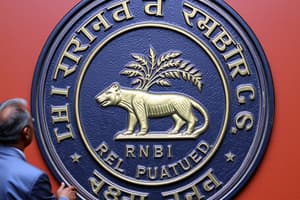Podcast
Questions and Answers
What is the basis for computing Tier-I capital for the purpose of exposure norms?
What is the basis for computing Tier-I capital for the purpose of exposure norms?
- As per IFRS accounting standards
- As per RBI guidelines for commercial banks
- As prescribed for computation of capital adequacy of UCBs (correct)
- As per Basel norms for capital adequacy
What type of exposure does not include loans and advances granted against the security of bank's own term deposits?
What type of exposure does not include loans and advances granted against the security of bank's own term deposits?
- Market exposure
- Investment exposure
- Credit exposure (correct)
- Off-balance sheet exposure
What is considered for arriving at credit exposure limit?
What is considered for arriving at credit exposure limit?
- Average of sanctioned limit and outstanding amount
- Only outstanding amount
- Only sanctioned limit
- Higher of sanctioned limit or outstanding amount (correct)
What is included in credit exposure?
What is included in credit exposure?
What type of financing is included in credit exposure?
What type of financing is included in credit exposure?
What is the date of the letter addressed to the Chief Executive Officers of All Primary (Urban) Co-operative Banks?
What is the date of the letter addressed to the Chief Executive Officers of All Primary (Urban) Co-operative Banks?
What is the subject of the Master Circular referred to in the letter?
What is the subject of the Master Circular referred to in the letter?
Who is the Chief General Manager signing off the letter?
Who is the Chief General Manager signing off the letter?
What is the website mentioned in the letter where the Master Circular is available?
What is the website mentioned in the letter where the Master Circular is available?
What is the number of the Master Circular mentioned in the letter?
What is the number of the Master Circular mentioned in the letter?
What is the relationship between units coming under common ownership?
What is the relationship between units coming under common ownership?
What type of advances are excluded from unsecured advances?
What type of advances are excluded from unsecured advances?
What is the maximum usance period for inland D/A bills to be considered unsecured advances?
What is the maximum usance period for inland D/A bills to be considered unsecured advances?
What type of advances are granted to salaried employees against personal security?
What type of advances are granted to salaried employees against personal security?
What is the purpose of packing credit for exports?
What is the purpose of packing credit for exports?
What type of advances are secured by legal assignment of contract moneys?
What type of advances are secured by legal assignment of contract moneys?
As per the Reserve Bank of India, what is the specific date for assessing financial parameters?
As per the Reserve Bank of India, what is the specific date for assessing financial parameters?
What is the condition for salary earners' banks to allow advances in excess of the prescribed limits?
What is the condition for salary earners' banks to allow advances in excess of the prescribed limits?
What is the purpose of fixing a general limit for advances by the bank?
What is the purpose of fixing a general limit for advances by the bank?
What type of borrowers are advances granted to, according to the State Co-operative Societies Act?
What type of borrowers are advances granted to, according to the State Co-operative Societies Act?
Why are advances granted by UCBs, other than salary earners' societies, considered secured?
Why are advances granted by UCBs, other than salary earners' societies, considered secured?
What is the purpose of reckoning advances as secured or unsecured?
What is the purpose of reckoning advances as secured or unsecured?
How often should approved loan proposals be placed before the Audit Committee of the Bank?
How often should approved loan proposals be placed before the Audit Committee of the Bank?
Who should not be given loans against shares?
Who should not be given loans against shares?
What should be reported to the Board in its subsequent meeting?
What should be reported to the Board in its subsequent meeting?
What type of shares can UCBs not grant loans for?
What type of shares can UCBs not grant loans for?
What is a requirement for NBFCs to avail loans from a UCB?
What is a requirement for NBFCs to avail loans from a UCB?
What investments are UCBs prohibited from making?
What investments are UCBs prohibited from making?
Flashcards are hidden until you start studying
Study Notes
Capital Adequacy and Exposure
- Tier-I capital for UCBs is the same as prescribed for computation of capital adequacy, as amended from time to time.
- Exposure includes both credit exposure (loans and advances) and investment exposure (non-SLR securities).
Credit Exposure
- Includes funded and non-funded credit limits, underwriting and similar commitments, and facilities extended by way of equipment leasing and hire purchase financing.
- Excludes loans and advances granted against the security of bank's own term deposits.
- The sanctioned limit or outstanding, whichever is higher, is reckoned for arriving at credit exposure limit.
Unsecured Advances
- Includes clean overdrafts, loans against personal security, and clean bills or Multani hundies purchased or discounted.
- Excludes advances backed by guarantee of central or state governments, public sector financial institutions, banks, and Deposit Insurance & Credit Guarantee Corporation, among others.
Other Restrictions
- Co-operative Societies Act of the State concerned contains an obligatory provision for deduction of periodical loan instalments by the employer out of employee's salary / wages to meet bank's claims.
- Advances granted to salaried employees against personal security are allowed in excess of the limits prescribed above, subject to certain conditions.
Loan Proposals and Reporting
- Approved loan proposals should be placed before the Audit Committee of the Bank at least once in two months.
- The Management and Audit Committee should ensure that all loans against shares are made only to those individuals who are not in any way connected with any stock broking entity.
- Details of the loan sanctioned should be reported to the Board in its subsequent meeting.
Bank Finance
- UCBs shall not grant any loan or advance to any person for purchasing their own Perpetual Non Cumulative Preference Shares (PNCPS), Tier-II preference shares, Perpetual Debt instruments (PDI), and Long Term Subordinated bonds (LTSB).
- UCBs shall not grant any loan or advance to any person for purchasing PNCPS, Tier-II preference shares, PDI, and LTSB of other banks.
- UCBs should not invest in PNCPS (Tier-I), other Preference shares (Tier-II), and also in Long Term (Subordinated) Deposits (Tier-II), PDI, LTSB issued by other banks; nor should they grant advances against the security of the above instruments issued by them or other banks.
Bank Finance to Non-Banking Financial Companies (NBFCs)
- Admission of NBFCs as members is a must for availing loans or advances from a UCB.
Studying That Suits You
Use AI to generate personalized quizzes and flashcards to suit your learning preferences.




